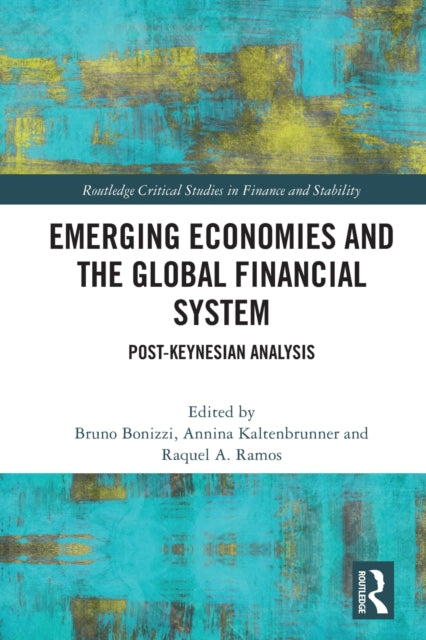Shulph Ink
Emerging Economies and the Global Financial System: Post-Keynesian Analysis
Emerging Economies and the Global Financial System: Post-Keynesian Analysis
YOU SAVE £1.92
- Condition: Brand new
- UK Delivery times: Usually arrives within 2 - 3 working days
- UK Shipping: Fee starts at £2.39. Subject to product weight & dimension
Bulk ordering. Want 15 or more copies? Get a personalised quote and bigger discounts. Learn more about bulk orders.
Couldn't load pickup availability
- More about Emerging Economies and the Global Financial System: Post-Keynesian Analysis
This book provides a comprehensive overview of the financial integration of emerging economies through an in-depth analysis of the international monetary system, its impact on capital flows and exchange rates, and its implications for policy making. Post-Keynesian economists highlight the inherent character of shocks imposed by financial integration upon emerging economies and their implications for economic growth and distribution.
Format: Paperback / softback
Length: 278 pages
Publication date: 09 January 2023
Publisher: Taylor & Francis Ltd
The financial integration of emerging economies has been a remarkable development of the past two decades. The growth of cross-border transactions and asset ownership, not least through the accumulation of foreign exchange reserves, has put many of these countries in a more prominent, if still peripheral, position within the global financial system. This has not been a smooth process, as integration has been marked by cyclical waves of capital flows, with financial and currency instability often accompanying the acute phases of these cycles. While conventional economic theory traditionally sees financial integration as a positive development, Post-Keynesian economists, working in the tradition of Keynes, Minsky, and Kalecki, have long taken a more sceptical viewpoint. By centring the analysis of financial dynamics on concepts as liquidity, uncertainty, balance-sheet structures, and institutions, Post-Keynesian theory highlights the intrinsic character of shocks imposed by financial integration upon emerging economies, and their implications for economic growth and distribution. This book demonstrates that these analyses can be fruitfully used to gain a better understanding of financial (in)stability and economic development in emerging economies as they integrate into the global financial system.
This work provides key reading for students and scholars of economics, political economy, and finance that are interested in the financial integration of emerging economies, and how the heterodox tradition of Post-Keynesian economics can contribute to our understanding of these complex processes.
The international monetary system (IMS) is a crucial framework for understanding the financial integration of emerging economies. The IMS is a complex network of institutions, rules, and policies that govern the exchange of currencies and the flow of capital across borders. The book provides a comprehensive overview of the IMS, including its history, structure, and key players.
One of the key themes of the book is the impact of the IMS on capital flows
flows and exchange rates. The IMS is designed to promote financial stability and economic growth, but it can also have unintended consequences for emerging economies. For example, the accumulation of foreign exchange reserves by emerging economies can lead to a depreciation of their currency, which can make their exports more expensive and reduce their competitiveness in global markets.
The book also explores the implications of financial integration for policy making. The IMS is governed by a set of international agreements, such as the Bretton Woods system and the International Monetary Fund (IMF), which set the rules for exchange rates, capital flows. However, these agreements can be subject to political pressure and can be modified or abandoned if they are perceived to be in the interests of developed countries. This can have significant consequences for emerging economies, as it can lead to financial instability and currency crises.
The book also discusses the role of institutions in promoting financial integration. The IMS is dominated by a handful of large financial institutions, such as the World Bank, the IMF, and the Bank for International Settlements (BIS). These institutions play a crucial role in shaping the global financial system, but they can also be subject to criticism for their role in promoting financial instability and inequality.
The book also explores the challenges that emerging economies face in integrating into the global financial system. These challenges include issues such as weak financial infrastructure, limited access to capital, and political instability. The book provides a range of policy recommendations for emerging economies to promote financial integration and stability, including measures to improve financial infrastructure, promote investment, and strengthen financial regulation.
In conclusion, this book provides a comprehensive and insightful analysis of the financial integration of emerging economies. It provides a valuable contribution to the literature on economics, political economy, and finance, and it will be of interest to students, scholars, and policymakers alike. The book provides a comprehensive and insightful analysis of the financial integration of emerging economies. It provides a valuable contribution to the literature on economics, political economy, and finance, and it will be of interest to students, scholars, and policymakers alike.
Weight: 535g
Dimension: 234 x 156 (mm)
ISBN-13: 9780367700591
This item can be found in:
UK and International shipping information
UK and International shipping information
UK Delivery and returns information:
- Delivery within 2 - 3 days when ordering in the UK.
- Shipping fee for UK customers from £2.39. Fully tracked shipping service available.
- Returns policy: Return within 30 days of receipt for full refund.
International deliveries:
Shulph Ink now ships to Australia, Belgium, Canada, France, Germany, Ireland, Italy, India, Luxembourg Saudi Arabia, Singapore, Spain, Netherlands, New Zealand, United Arab Emirates, United States of America.
- Delivery times: within 5 - 10 days for international orders.
- Shipping fee: charges vary for overseas orders. Only tracked services are available for most international orders. Some countries have untracked shipping options.
- Customs charges: If ordering to addresses outside the United Kingdom, you may or may not incur additional customs and duties fees during local delivery.


